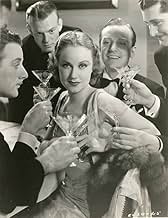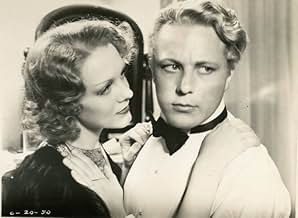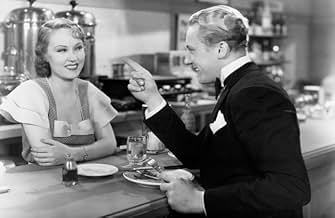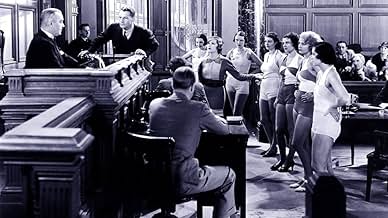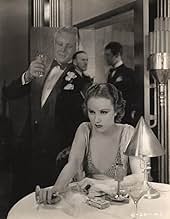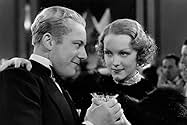अपनी भाषा में प्लॉट जोड़ेंAfter graduation from Hampden University, Bill "Lightning" Graham, a football star, and Ann Carver, who just passed her bar exam, marry. Instead of pursuing a career in law, Ann takes on the... सभी पढ़ेंAfter graduation from Hampden University, Bill "Lightning" Graham, a football star, and Ann Carver, who just passed her bar exam, marry. Instead of pursuing a career in law, Ann takes on the role of housewife, while Bill is employed as a draftsman. When Ann is asked to take on a ... सभी पढ़ेंAfter graduation from Hampden University, Bill "Lightning" Graham, a football star, and Ann Carver, who just passed her bar exam, marry. Instead of pursuing a career in law, Ann takes on the role of housewife, while Bill is employed as a draftsman. When Ann is asked to take on a high-profile legal case, she accepts and wins. She becomes an overnight success and a medi... सभी पढ़ें
- Andrew Simmons - Attorney
- (बिना क्रेडिट के)
- Irma Chappelle
- (बिना क्रेडिट के)
- Melville - Butler
- (बिना क्रेडिट के)
- Baker
- (बिना क्रेडिट के)
- Dinner Party Guest
- (बिना क्रेडिट के)
- Dinner Party Guest
- (बिना क्रेडिट के)
- Coroner
- (बिना क्रेडिट के)
- Harrison
- (बिना क्रेडिट के)
- Bill's Architect Co-Worker
- (बिना क्रेडिट के)
- Bill's Lawyer
- (बिना क्रेडिट के)
- Trial Witness
- (बिना क्रेडिट के)
फ़ीचर्ड समीक्षाएं
The Grahams get posher digs, they have servants, all on Ann's money. When Bill can't pay the household servants when Ann is away on business, he quits his drafting job and gets a job singing at a club, using his football celebrity as collateral because it means much more money. Unfortunately the other singer who got him this job is played by Claire Dodd. It's always a bad omen to pal around with Claire Dodd in a precode. The Graham marriage breaks apart, and Bill takes to drinking heavily, sometimes with and sometimes without Dodd, whose advances he rebuffs.
Then Dodd's character dies and Bill gets accused of her murder. And in a preposterous development Ann defends him at trial by claiming - truly - that nobody can find a motive for Bill murdering the woman, and -ridiculously - besides it was all her (Ann's) fault because she wanted a career. How dare her! How will this turn out, watch and find out.
What makes this very paint by numbers plot rise a star above mediocre is the twist of how Claire Dodd's character actually dies. Nobody ever figures it out, except the audience, who witnesses the entire thing. The 1930's equivalent of Quincy does not come along and solve the riddle. And I don't think I've ever seen anything quite like it.
Also, there is a very precode courtroom scene, where Ann makes her name. She is defending a breech of promise suit - that is where a man promises to marry a woman and then backs out. In the 30s this could mean big bucks for the woman if the man was rich, and in this case he is. The reason he backed out was that he found out the woman was black. She claimed that he always knew she was black, and that it should have been obvious when they went swimming that she was. That she never hid her race or lied to him. The opposing counsel says that anybody should be able to tell a black woman from a white one. So Ann brings in six women - three white, three black, but all of the same skin color - and demands that the opposing counsel say who is who. The judge breaks up this circus but the point is made and the woman suing the rich man loses. Now this all sounds very racist because it is, but it was cut out of versions of this film shown in the production code era that started the following year because - wait for it - the film is making it look like race is only skin deep AND that a white man could be married to a black woman and never even know it. Oh the horror!
Sometimes even very formulaic old films are worth seeking out for the twenty minutes or so that they are NOT formulaic.
This 1933 film stars Fay Wray, Gene Raymond, and Claire Dodd. The story will leave you in shock.
Raymond plays a college football star, Bill Graham, who now is working his way up in business, except that he feels stagnant. His wife Ann (Wray) was an attorney, and now she's his wife, and they're very much in love. One night at a party, she criticizes a big attorney for the way he's trying a case, and he wants to hire her. Her husband is thrilled for her and very proud.
Ann becomes a star overnight when she replaces the lead attorney on a case that will have your jaw drop to the floor. A man is on trial for consorting with a black woman he claims he did not know was black. She is on the stand and has to show her shoulder so that everyone can see her skin is darker than it is on her face. Ann wins the case by bringing women in wearing bathing suits and asking the prosecution to pick out the black women.
Okay, we made it through. The boss is so impressed that he gives her $5,000, equal to $84,000 today - this is when people made something like $100 a month, and that was a good salary. Her husband has just gotten a raise, but when she shows him her check, he doesn't say anything about it.
As Ann becomes more famous, Bill feels like he's going nowhere. He takes a job singing in a nightclub, which in the beginning Ann wanted him to take. Now, she's embarrassed and furious. He meets a woman there who is crazy about him; he starts drinking and the two have an affair. One night, she dies by accident. Bill is arrested for her murder. Ann defends him.
Ann is clearly portrayed as the villain here, putting her career before her husband and becoming haughty. Today when she got married, she would have kept working. In those days, the husband was considered a failure if his wife worked. Two-career households are very difficult, no one is denying that, and finding time together takes work and commitment. But that isn't what Ann Carver's Profession is about. It's about the importance of a woman putting her husband and her husband's ego first and taking a back seat.
Someone mentioned Fay Wray's acting in the courtroom scene as being over the top. Watch John Beal's courtroom speech in Madame X. Today it seems over the top. Back then, that was considered good acting. A lot of actors came from the stage and brought that training to film, and I think the acting on stage back then was a little bigger than we see today. As Bette Davis said, "Actors today want to be real. But real acting is larger than life." If you see this listed on TCM, take a look at it. It's a wonderful look at the mores and attitudes back then, so different from what they are today. The cast is good, and the film moves quickly. It's an artifact -- in fact, it's an antique.
** 1/2 (out of 4)
Entertaining curio from Columbia has Fay Wray playing a wife turned brilliant lawyer who must defend her estranged husband (Gene Raymond) when he is accused of killing a nightclub singer (Claire Dodd). This is an extremely interesting little gem that manages to be entertaining as a film but also because of the way it showed women and race of the time. The husband ends up leaving the wife because she's making more money than him, which is something he's embarrassed about. Seeing a woman work here way up without using sexuality is something else not all that common from films of this era. The way the film views race is another interesting thing because Wray's first big trial is a black woman charged with dating a white man but not telling him she was black. This entire courtroom scene is rather jaw dropping as even blackface doesn't seen as out of date as this sequence. We see the attorney bring in "questionable" black women who might be white. The entire sequence is surreal, strange and certainly something you probably won't see in too many movies. The biggest problem with the film comes in the final ten minutes when the trial of the husband actually starts. The actual ending is a downright disaster but even worse is how we get to that ending with a certain speech inside the court. It was so bad I actually wanted to hit the mute button. Wray turns in a decent performance, although I think she goes a tad bit over the top during some of the court scenes. Raymond, Dodd and the rest of the supporting cast do fine work and the director keeps everything moving at a nice pace. This is yet another forgotten film that popped up on Turner Classic Movies and it's one more should check out as it gives us a rather interesting insight to some rather strange topics.
What had happened was that Ann Carver Graham (Fay Wray) and her husband Bill Graham had split up when Ann's career became too great for Bill to handle. Bill finally got a job singing at a local night club that made him happy. But one evening Ann catches Bill in the presents of another woman named Carole Rodgers and thinks the worse. Bill then moves out of the house leaving both Ann and Bill feeling bad about the situation.
When Carole is found dead, Bill is arrested for murder. Ann, his separated wife, will defend him. The case looks bad for Bill but Ann will give a stirring speech to the jurors in order to free the man she loves.
As many already said, this is a B type movie. Most of the acting is poor and the film feel cheaply made. It made be nice to look back and see the fashion of the day but little else can be obtained from this picture.
क्या आपको पता है
- ट्रिवियाThe scene in which Ann Carver (Fay Wray) wins a breach-of-promise suit for her client by forcing his accuser to lower her dress sleeve to prove that she's really black was inspired by a famous 1924 court case in New York. Socialite Leonard "Kip" Rhinelander sought to have his marriage to former servant girl Alice Jones annulled on the ground that she was half-black and had concealed this from him. In the real case, Jones not only had to expose her shoulder but had to strip from the waist up, and the jury members examined her torso in the judge's chambers to determine the color of her nipples and therefore decide whether she was black or white. Also, unlike the rich client in the movie, Rhinelander lost his case.
- गूफ़सभी एंट्री में स्पॉइलर हैं
- भाव
William 'Bill' 'Lightning' Graham: Would you be interested in this?
[holds up some kind of fowl]
Ann Carver Graham: What is it?
William 'Bill' 'Lightning' Graham: It's a Guinea hen.
Ann Carver Graham: No, I don't care for Italian food.
- कनेक्शनRemade as The Lady Objects (1938)
- साउंडट्रैकThere's Life in Music
Written by Charles Rosoff
टॉप पसंद
विवरण
- चलने की अवधि1 घंटा 8 मिनट
- रंग
- पक्ष अनुपात
- 1.37 : 1
इस पेज में योगदान दें


